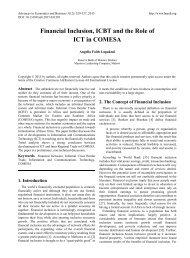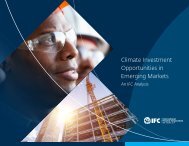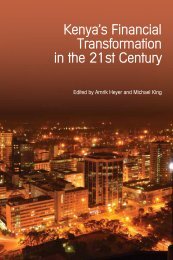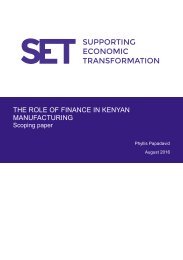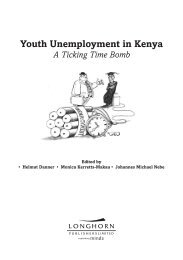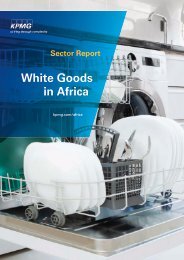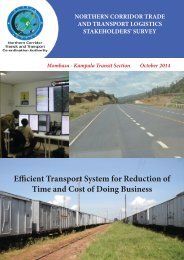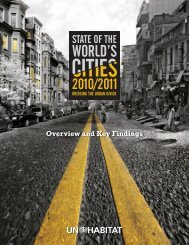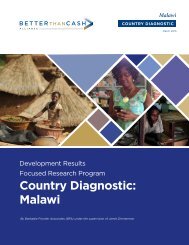FD
gvti301SEaf
gvti301SEaf
Create successful ePaper yourself
Turn your PDF publications into a flip-book with our unique Google optimized e-Paper software.
some countries, it might make sense to augment domestic<br />
revenue with borrowing, especially for priority infrastructure<br />
projects. But the burden of debt is accelerating, interest rates<br />
are rising, and spreads on sovereign bond issues in Africa are<br />
climbing quickly—putting the brakes on further borrowing.<br />
Second, countries must move aggressively to diversify their<br />
economies away from dependence on commodity exports.<br />
Governments must establish more favorable environments<br />
for private investment in downstream agricultural processing,<br />
manufacturing, and services (such as data entry), which<br />
can help expand job creation, accelerate long-term growth,<br />
reduce poverty, and minimize vulnerability to price volatility.<br />
The effects of the current commodity price shocks are so<br />
large precisely because countries have not diversified their economic<br />
activities. The exact steps will differ by country, but they<br />
Countries must move aggressively to<br />
diversify their economies away from<br />
dependence on commodity exports.<br />
begin with increasing agricultural productivity, creating more<br />
effective extension services, building better farm-to-market<br />
roads, ensuring that price and tariff policies do not penalize<br />
farmers, and investing in new seed and fertilizer varieties.<br />
Investments in power, roads, and water will be critical. As in<br />
east Asia, governments should coordinate public infrastructure<br />
investment in corridors, parks, and zones near population<br />
centers to benefit firms through increased access to electricity,<br />
lower transportation costs, and a pool of nearby workers, which<br />
can significantly reduce production costs. Financing these<br />
investments will require a deft combination of prudent borrowing<br />
mixed with higher domestic revenue. At the same time, the<br />
basic costs of doing business remain high in many countries.<br />
To help firms compete, governments must lower tariff rates,<br />
cut red tape, and eliminate unnecessary regulations that inhibit<br />
business growth. Now is the time to slash business costs and<br />
help firms compete domestically, regionally, and globally.<br />
Third, Africa’s surge of progress cannot persist without<br />
strong education and health systems. The increases in school<br />
enrollment and completion rates, especially for girls, are good<br />
first steps. But school quality suffers from outdated curricula,<br />
inadequate facilities, weak teacher training, insufficient local<br />
control, teacher absenteeism, and poor teacher pay. The coming<br />
years call for dramatic improvement in quality to equip<br />
students—especially girls—with the skills they need to be productive<br />
workers. Similarly, health systems remain weak, underfunded,<br />
and overburdened, as was illustrated so clearly during<br />
the recent Ebola virus disease outbreak (see “After Ebola” in<br />
this issue of F&D). Robust efforts are needed to improve access<br />
to health facilities, train providers, bolster the delivery of basic<br />
health services, and strengthen health systems more broadly.<br />
Fourth, continued long-term progress requires building<br />
institutions of good governance and deepening democracy.<br />
The transformation during the past two decades away from<br />
authoritarian rule is remarkable, but it remains incomplete.<br />
Better checks and balances on power through more effective<br />
legislative and judicial branches, increased transparency and<br />
accountability, and strengthening the voice of the people are<br />
what it takes to sustain progress. Some nondemocratic countries<br />
have done well, but the majority of authoritarian governments<br />
have been governance disasters.<br />
Finally, the international community has an important role to<br />
play. Foreign aid has helped support the surge of progress, and<br />
continued assistance will help mitigate the impacts of the current<br />
slowdown. Larger and longer-term commitments are required,<br />
especially for better-governed countries that have shown a<br />
strong commitment to progress. To the extent possible, direct<br />
budget support will help ease adjustment difficulties for countries<br />
hit hardest by commodity price shocks. In addition, donor<br />
financing for infrastructure—preferably as grants or low-interest<br />
loans—will help build the foundation for long-term growth and<br />
prosperity. Meanwhile, this is not the time for rich countries to<br />
turn inward and erect trade barriers. Rather, wealthy nations<br />
should encourage further progress and economic diversification<br />
by reducing barriers to trade for products from African countries<br />
whose economies are least developed.<br />
It is easy to be pessimistic in the current global economic<br />
environment. But of course, it is always easy to be pessimistic.<br />
Most analysts were negative about Africa’s prospects in<br />
the mid-1990s, just as many countries there were turning<br />
around and beginning to rise. There was further pessimism<br />
during the global food crisis of 2007 and the 2008–09 financial<br />
crisis. But, against all odds, many countries across the<br />
region have experienced a remarkable transformation.<br />
The global slowdown presents major challenges that will<br />
not be easily overcome. Over the next few years, growth will<br />
probably remain moderate across the region, and the pace of<br />
overall development progress is likely to slow. In some countries,<br />
especially those reliant on a few commodity exports,<br />
the slowdown could be quite significant. Policymakers may<br />
not be able to generate rapid growth right away, but they can<br />
do much to keep the slowdown in check and strengthen the<br />
foundation for lasting progress. Looking ahead over a longerterm<br />
horizon, the fundamental improvements under way in<br />
governance, capacity building, and encouraging a new generation<br />
of leaders point to favorable prospects.<br />
With concerted action and courageous leadership, look for<br />
many African countries to continue to make substantial development<br />
progress over the next two decades and further reduce<br />
poverty, improve governance, and expand prosperity. ■<br />
Steven Radelet is Director of the Global Human Development<br />
Program at Georgetown University’s Edmund A. Walsh School<br />
of Foreign Service and author of The Great Surge: The Ascent<br />
of the Developing World.<br />
Reference:<br />
Arndt, Channing, Sam Jones, and Finn Tarp, 2015, “What Is the<br />
Aggregate Economic Rate of Return to Foreign Aid?” World Bank<br />
Economic Review, July, pp. 1–29.<br />
Finance & Development June 2016 11




